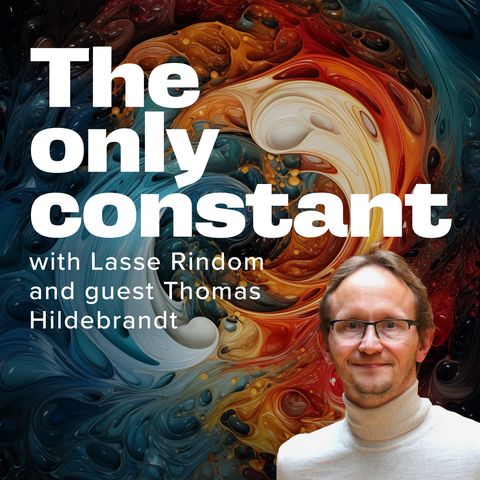Episode #20 | Thomas Hildebrandt| The relationship between AI technology, law, and societal impacts
7 mag 2024 ·
1 h 3 min. 2 sec.

Scarica e ascolta ovunque
Scarica i tuoi episodi preferiti e goditi l'ascolto, ovunque tu sia! Iscriviti o accedi ora per ascoltare offline.
Descrizione
In this episode, Lasse Rindom engages in a detailed conversation with Thomas Hildebrandt, a distinguished computer scientist and professor at the University of Copenhagen. Their dialogue explores the intricate relationship...
mostra di più
In this episode, Lasse Rindom engages in a detailed conversation with Thomas Hildebrandt, a distinguished computer scientist and professor at the University of Copenhagen.
Their dialogue explores the intricate relationship between AI technology, law, and societal impacts, shedding light on unique challenges and opportunities.
Overall, the episode offers you a deep dive into the complexities of AI technology, providing a perspective on its current capabilities and its potential for future applications that are both beneficial and ethically sound.
Here are some highlights from their discussion:
Do you want to learn more about Thomas Hildebrandt?
Thomas Hildebrandt is Professor at the Department of Computer Science, Copenhagen University. He has worked on digitalization of business processes, law, AI and decision support systems for more than 15 years in collaboration with public and private companies.
He has been investigator in several inter-disciplinary research projects in collaboration with legal scholars and is the inventor of a knowledge graph-based process modelling language, Dynamic Condition Response graphs, which is embedded in commercial enterprise information systems and used widely in the public sector in Denmark and beginning to be applied outside Denmark.
Thomas is also member of the advisory board of the Danish D-seal, a quality seal for responsible and secure use of data, and the Danish Standards group for AI, thereby participating in the work on EU and Global ISO standards for AI. In particular he has been the main author of a Danish public available specification on AI for decision support in the public sector.
mostra meno
Their dialogue explores the intricate relationship between AI technology, law, and societal impacts, shedding light on unique challenges and opportunities.
Overall, the episode offers you a deep dive into the complexities of AI technology, providing a perspective on its current capabilities and its potential for future applications that are both beneficial and ethically sound.
Here are some highlights from their discussion:
- Thomas delves into the innovative realm of "computational law," where he discusses the use of AI to streamline and clarify complex legal frameworks.
- The discussion also addresses the consequences of misinterpreting AI outputs and the ethical considerations that surround its deployment.
- The conversation further explores AI's implications for education and professional development. Thomas expresses concerns about AI potentially undermining substantive learning and critical thinking skills among students and workforce members.
- Highlighting a future-forward approach, Thomas talks about combining AI with rule-based systems to improve their reliability and ensure accountability, emphasizing the importance of keeping humans in the loop to validate and correct AI operations.
- The episode concludes with a broad analysis of the international regulatory environment for AI, comparing the different approaches taken by the EU, China, and the U.S. This discussion provides insight into how these strategies might influence the future interplay between technological advancements, human rights, and societal norms.
Do you want to learn more about Thomas Hildebrandt?
Thomas Hildebrandt is Professor at the Department of Computer Science, Copenhagen University. He has worked on digitalization of business processes, law, AI and decision support systems for more than 15 years in collaboration with public and private companies.
He has been investigator in several inter-disciplinary research projects in collaboration with legal scholars and is the inventor of a knowledge graph-based process modelling language, Dynamic Condition Response graphs, which is embedded in commercial enterprise information systems and used widely in the public sector in Denmark and beginning to be applied outside Denmark.
Thomas is also member of the advisory board of the Danish D-seal, a quality seal for responsible and secure use of data, and the Danish Standards group for AI, thereby participating in the work on EU and Global ISO standards for AI. In particular he has been the main author of a Danish public available specification on AI for decision support in the public sector.
Informazioni
| Autore | Basico |
| Organizzazione | Nicoline Thoning Filt |
| Sito | - |
| Tag |
Copyright 2024 - Spreaker Inc. an iHeartMedia Company
